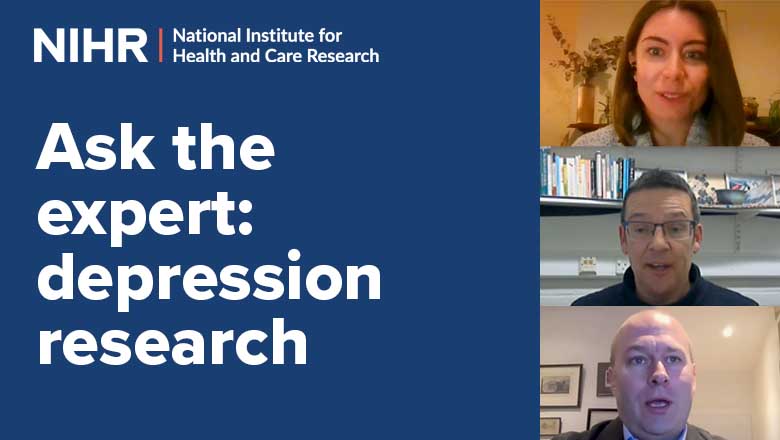In this webinar, presented by the National Institute for Health and Care Research (NIHR) and hosted by MQ’s own Director of Research Partnerships and Development Emily Wheeler, we heard from some experts into what the latest developments have been in the area of depression research.
Michael Browning, Professor of Computational Psychiatry at Oxford University talked about his research into the mechanisms and treatment for depression, and his work running a clinic for people with depression that is difficult to treat.
Barney Dunn, Professor of Clinical Psychiatry at the University of Exeter told us more about his work to develop more effective psychological therapies for depression.
The webinar covers a range of different developments in in research, from the trials taking place on psilocybin and other psychedelics to reducing inflammation, using social prescribing and understanding the social-economic influences that can increase the risk of depression.
Professor Dunn spoke about the research into anhedonia, or the lack of interest, pleasure or enjoyment from life’s experiences which is a common symptom experienced by people with depression.
“So we've been doing a lot of basic science work to understand what are the psychological and brain-based mechanisms that lead to deficits in motivation pleasure and the capacity to learn from good things and using that to develop novel therapies.” Says Dunn.
"One we're working on at the moment is called augmented depression therapy or ADepT and it's basically helping people find ways to reconnect to what's important to them and get pleasure out of it. In early and pilot trials, we're showing it looks like it has promising effects compared to CBT.”
ADepT was trailed at the Mood Disorders Centre at Exeter University and the study was funded by NIHR.
An important question that researchers are facing is how we can prevent depression from developing in the first place.
“We are often miserable because our social and material circumstances aren't very good and that couldn't be more apparent than the world we're in at the moment.” Says Dunn.
“People having to choose between heating and eating, kids not being able to get on a property ladder and an environmental crisis that people are worried about. I think all of those social factors are a major contributor to risk of depression, but also maintenance of depression. The interesting question from a [ ] treatment providers point of view is where can you intervene with that? [ ] I would start by going back to the Sure Start initiative that Labour government funded around the millennium, which was basically taking people at high risk at the stage they're starting to parent so their kids get the best start in life. Because we know that period just before people are born shaped their risk of mental health, and how they are parented in the first 3 or 4 years makes a big difference. So we could really intervene there [ ] so that the next generation have a better start and you block inter-generational transmission.”
The impact that poverty, discrimination and lack of opportunities can have on our mental health are the subject of a recent call for action from the Mentally Healthier Nations project. Of which MQ is a supporter. Led by the Centre for mental health, the Mentally Healthier Nations report is a call for all political parties to prioritize the nations mental health as part of their election manifesto commitment.
The evidence presented in this report is the product of in-depth research, and is testament to the importance of investment into mental health research if we are all to lead happier, healthier lives.
“It's generally a really exciting time [In depression research] because for many years we've had quite a small sort of number of treatments and they haven't really been innovated very much with new approaches. But there's a whole raft of new things that are either licensed or being researched at the moment." Professor Browning.



